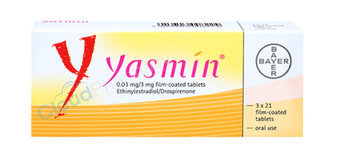Medication features
Yasmin is a combination birth control pill that combines two female sex hormones: ethinyl estradiol, an estrogen, and drespirenone, a progestin. This product is used to prevent pregnancy.
- Can decrease period pain
- Highly effective contraceptive pill
- Helpfully marked pill packets
Overview
Yasmin (containing ethinylestradiol and drospirenone) is a hormonal contraceptive, used to successfully prevent pregnancy. Yasmin, also referred to as 'the pill' or oral contraceptive pill, achieves this by stopping ovulation and blocking sperm from entering the womb.
The primary benefit of all oral contraceptives pills is convenience, because you do not need to worry about interrupting sex in order to be protected against pregnancy. If you take the first pill on day one of your period, you will be immediately protected. This means that you can enjoy sex without any interruptions and additional measures.
Yasmin in particular is a popular choice for a large number of women because the pills do not cause extra weight gain, which can be a side effect of other oral contraceptive pills. It also regulates periods, decreases blood loss, alleviates painful periods and significantly decreases the risk of ovarian cysts.
Side Effects
Prescription medications may trigger side effects when you first start using them. Yasmin is generally very well tolerated, but if you do experience side effects they are usually very mild. Some of the most common side effects include menstrual changes, headaches, abdominal pain, breast pain and nausea. If any of these potential side effects persist, you should contact a doctor.
When taking Yasmin 3mg / 30mcg tablets, it's important to take into account the below precautions to ensure your safety:
Yasmin pills shouldn't be taken if you are allergic to any of the ingredients found in the medication.
- Yasmin should also be used with caution if you are over the age of 35.
- If you are breastfeeding Yasmin shouldn't be taken until weaning or six months after birth.
- Yasmin tablets should be taken with caution if you are obese, have high blood pressure (hypertension), have heart failure, have a history of migraines, have inflammatory bowel disease (e.g. Crohn's disease), or if you have a family history of heart attacks or strokes before the age of 45.
- This medication should not be taken if you have ever had a blood clot in a vein, are over 50 years of age, smoke more than 40 cigarettes a day, or if you are dealing with angina, heart valve disease or an irregular heartbeat.
How do I take Yasmin?
Below is some advice regarding how to take Yasmin pills:
- Yasmin should be taken every day for 21 days, followed by a seven-day pill-free period and then you can continue with your next strip of 21 pills.
- If you seek immediate protection against pregnancy, it's advised that you take Yasmin on day one of your period.
- Alternatively, it can be taken up to day five of your period but you will have to wait seven days for the medication to take full effect. During these seven days, it will be best to use a barrier contraceptive such as a condom, just to be safe.
- It is not necessary to take Yasmin with food, but we advise that you take it at the same time everyday as this reduces the chances of you forgetting to take it one day.
Yasmin Pill FAQs
Are All Daily Oral Contraceptives The Same?
No, not all oral contaceptives are the same. There are many different types of oral contraception and each one differs slightly. Your oral contraception should be taken as directed by your prescriber. If you miss doses and do not take your pill as it has been prescribed it will not be as effective and may not work.
What Types of 'The Pill' Are Available?
There are two main types of oral contraception: The combined pill (CoC), which containes two hormones, progestin and oestrogen and the progesterone only pill (PoP), often referred to as the mini pill, contains only one hormone, progesterone. Both types of oral contraception the CoC and PoP are 99% effective if taken as prescribed meaning your chances of becoming pregnant if you have unprotected sex are very low. Although you are unlikley to become pregnant, you are still likely to contract a sexually transmitted infection if you are regularly having unprotected sex with different partners.
What is "The Pill"?
Contraceptive pills are often referred to as "The Pill". Contraceptive pills consist of synthetic hormones (hormones that mimic the ones made in your body). They are composed of a synthetic type of oestrogen and progesterone. The Combined Oral Contraceptive (CoC) containes both of these hormones and the Progeterone Only Pill (PoP) (The Mini-Pill) only contains one of these hormones (progestin).
If I Vomit or Have Diarrhoea After Taking The Pill, What Do I Do?
If you have severe diarrhoea or vomit 3-4 hours after taking your pill, the chances of you being protected from getting pregnant are less likely. If this does happen to you, you should take another pill within 12 hours of your episode. If you are taking the inactive pill when this happens then you do not have to take another pill to compensate.
How Reliable is Oral Contraception?
If your dose is taken as prescribed and then the pill is one of the most reliable forms of contraception when it comes to protecting you against pregnancy. The pill is 99% effective at preventing pregnancies if taken appropriately, however it does not protect against STI's meaning if you are having sex with different partners, barrier contraception should still be used.
How Hard is it to Remember to Take Oral Contraception?
If you manage to adopt a regular routine of taking your pill as soon as you get up, you are less likely to forget. If you do find that you are more likely to forget then it is best to set reminders on your phone. Alternatively there are many apps avaialbe for android and iOS such as myPill that can help you to remember to take your pill.
Do I Have to Take My Pill at The Same Time Everyday?
Routine is imperative when you start taking oral contraception. The time of day you take the pill does not matter, however if you should pick to take it in the morning, afternoon or night time- whatever time you decide to choose you must be consistent with it and continue to take it during this period of time every day.
Can I Still Have Sex During The 4 or 7-Day Break?
It is safe to have sex during the the break if you have been taking your pill properly as prescribed. If you are having regular unprotected sex during this time you should be vigilant to start your next pack or strip on time and to make sure you are taking your pill properly.
I Have Not Had My Period And I Have Been Taking My Pill as Prescribed, am I Pregnant?
It is important to understand that if you have been taking your pill on time everyday as directed by your prescriber then the chances of you being pregnant are extremely low. If you are not getting your period whilst taking the pill then there is a chance that the lining of the womb has not formed enough for it to be released, if you continue to not see any bleeding or have a period for 2 months or more than you should contact your prescriber for investigation.
Related Guides
Delve into a variety of content written by our medical experts
Yasmin Pill Reviews
Confirm Yasmin Pill treatment selection
| 3mg/30mcg | 63 | £23.80 |
| 3mg/30mcg | 126 | £46.99 |
















